Key takeaways:
- The UK news media is diverse, influenced by history, culture, and technology, requiring consumers to discern between sensationalism and responsible journalism.
- Maintaining a balanced approach to news consumption is essential for clarity, empathy, and understanding complex issues.
- Challenges include navigating information overload, verifying facts, and experiencing emotional fatigue, highlighting the need for critical thinking.
- Strategies for balanced news consumption include setting boundaries, diversifying sources, and reflecting on emotional responses to the news.
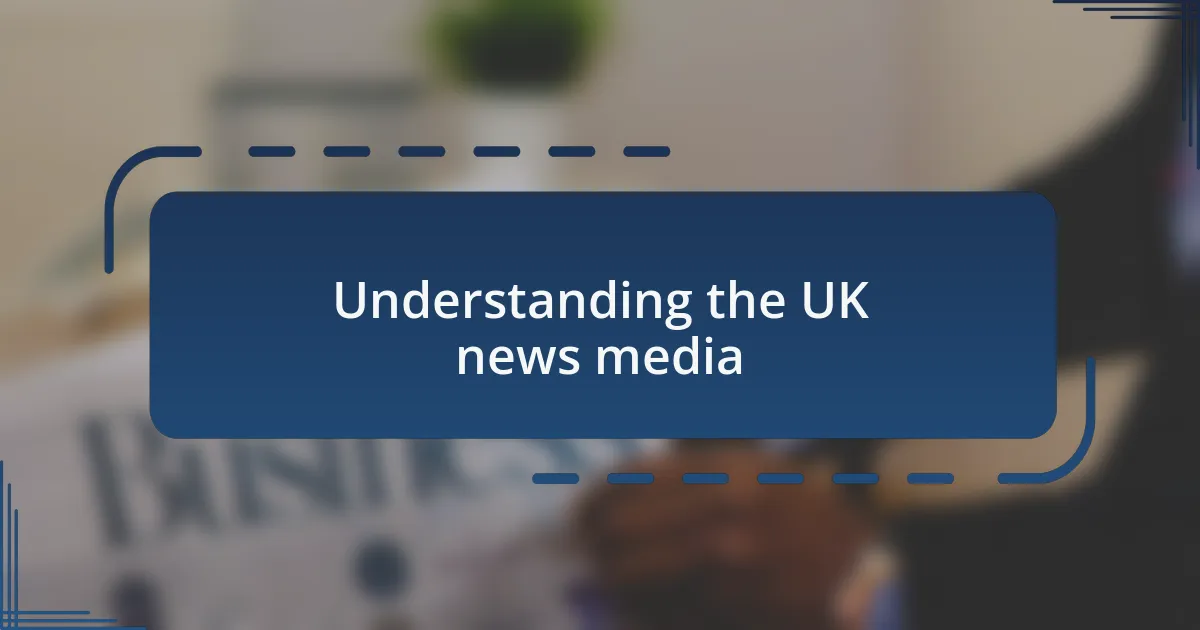
Understanding the UK news media
The UK news media is a diverse landscape shaped by history, culture, and technology. I remember sitting in my university lectures, discussing how different outlets influenced public opinion and shaped national discourse. It was a fascinating realization to see just how much our understanding of news is tied to the distinct voices of each publication, from broadsheets to tabloids.
One striking aspect is the balance between sensationalism and responsible journalism. I often find myself questioning: how do certain stories dominate headlines while others simmer quietly? It speaks volumes about what the media prioritizes and how it engages—or fails to engage—its audience.
Digital transformation has further complicated this environment. I recall the excitement and anxiety when social media emerged as news platforms. It changed the game, offering immediacy and accessibility but also stirring concerns about misinformation. Engaging with the news today requires a level of discernment that I didn’t have to ponder as deeply in the past.
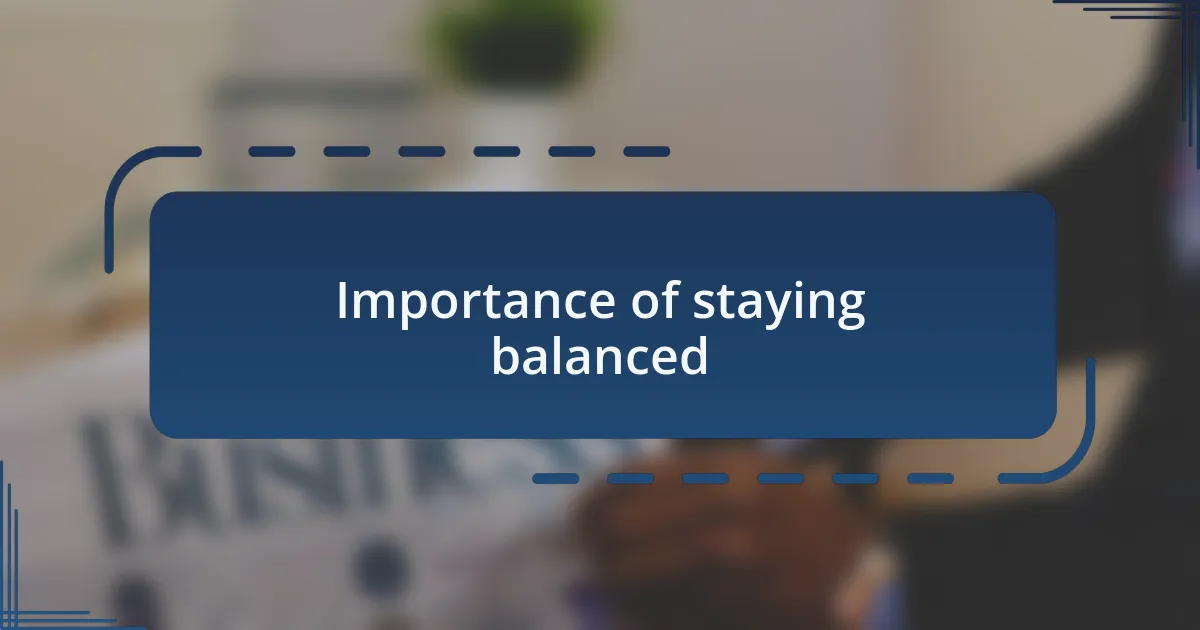
Importance of staying balanced
Staying balanced in today’s fast-paced media world is crucial, not just for news consumers but for society at large. I often reflect on my own challenges in filtering the overwhelming flow of information. With so many opinions and narratives out there, I find that a balanced approach helps me find clarity amidst the noise, reminding me of what truly matters.
When I take the time to evaluate multiple perspectives, I discover a more nuanced understanding of complex issues. There have been moments when I’ve been swayed by a particularly compelling article or headline, only to realize later that I missed key facts from opposing viewpoints. This experience taught me that maintaining balance not only enriches my personal knowledge but also fosters empathy and constructive dialogue with others.
In my everyday life, I strive for balance by dedicating time to consume varied sources. I remember a week when I intentionally read articles from a wide range of outlets—some I agreed with and others I didn’t. It was enlightening. Engaging with diverse perspectives not only helped me evolve my own views but also reinforced the importance of balanced discourse in fostering a well-informed community.
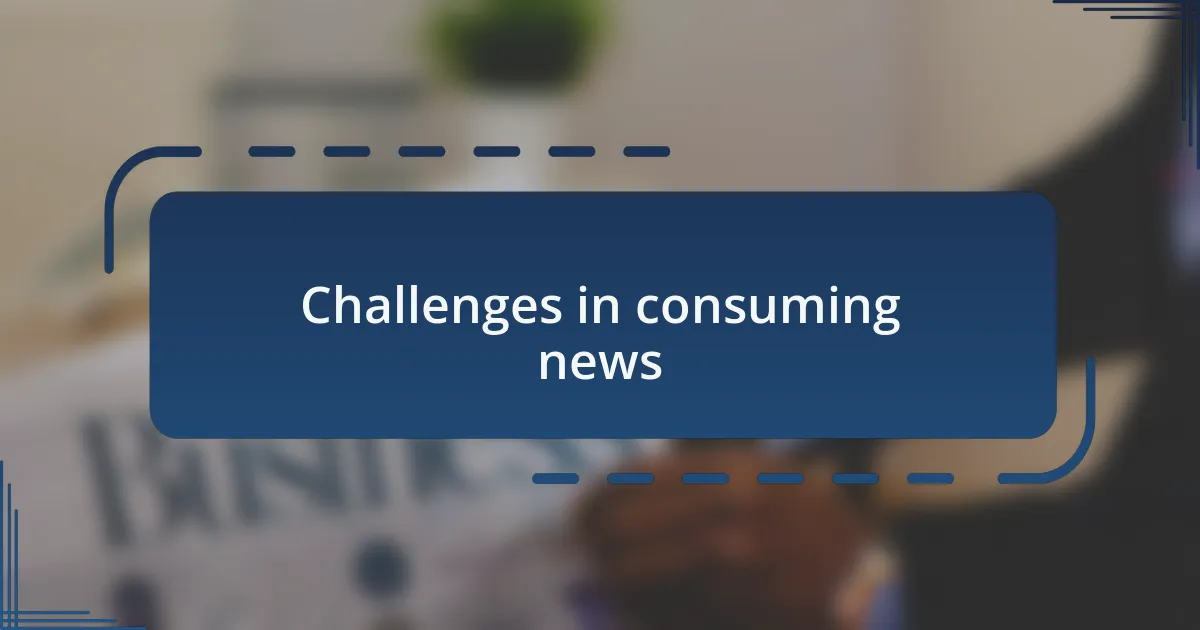
Challenges in consuming news
One of the primary challenges in consuming news today is navigating the barrage of information from various sources. I often find myself scrolling through social media, bombarded by headlines that evoke strong emotions—anger, sadness, confusion. Isn’t it ironic how, in the quest for knowledge, I sometimes end up feeling more lost? The sheer volume of news can create a paradoxical effect; rather than becoming informed, I occasionally feel overwhelmed and unsure of where to turn for reliable information.
Another hurdle is discerning the validity of the facts presented. There have been instances when I fell victim to sensationalist headlines that were designed to provoke rather than inform. I’ll never forget the time I shared a story that, upon further investigation, turned out to be significantly flawed. It felt embarrassing and taught me to pause and verify before reacting. I ask myself, how many others might be sharing similar content without considering its accuracy? This realization underscores the importance of critical thinking in our digital age.
Lastly, emotional fatigue from constant exposure to distressing news can weigh heavily on anyone’s mind. I came to a point where my daily news routine left me feeling worn out, rather than empowered. I had to learn to take breaks and approach my consumption with intention. Sometimes I wonder, how can we engage with the news without being overwhelmed? Finding that balance is key if we want to stay informed yet not lose ourselves in the noise.
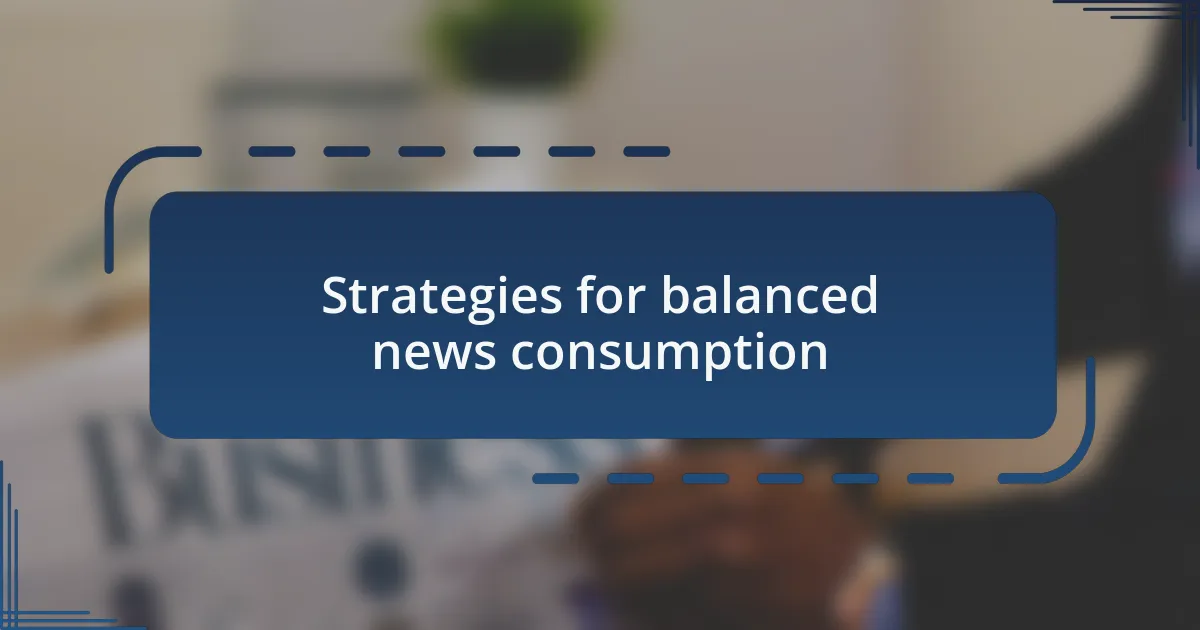
Strategies for balanced news consumption
It’s essential to create boundaries around news consumption to foster a balanced perspective. I’ve found that setting specific times during the day to check the news helps me manage my intake. Instead of mindlessly scrolling through updates at all hours, I dedicate a half-hour in the morning and evening. Does this ritual keep me grounded? Absolutely! It allows me to approach the news with a clear mind and reduces the impulse to react in the heat of the moment.
Diversifying my news sources has been another game changer for me. I realized that sticking to one or two outlets often painted a limited picture of events. By intentionally seeking out varied perspectives—like alternative media, podcasts, or even local news—I get a broader understanding of what’s happening. Have you ever noticed how different outlets can color the same story in entirely different ways? This broadens my viewpoint and cultivates a more nuanced understanding of the world.
Lastly, I’ve adopted a practice of reflecting on what I consume. After reading an article, I pause to consider my emotional response. Does it leave me feeling hopeful or downtrodden? By acknowledging my feelings and analyzing why I feel that way, I can better gauge the impact news has on my psyche. Have you ever taken a moment to check in with your emotions after a news binge? This self-awareness allows me to switch gears quickly if I sense that the news is becoming more of a burden than a source of information.
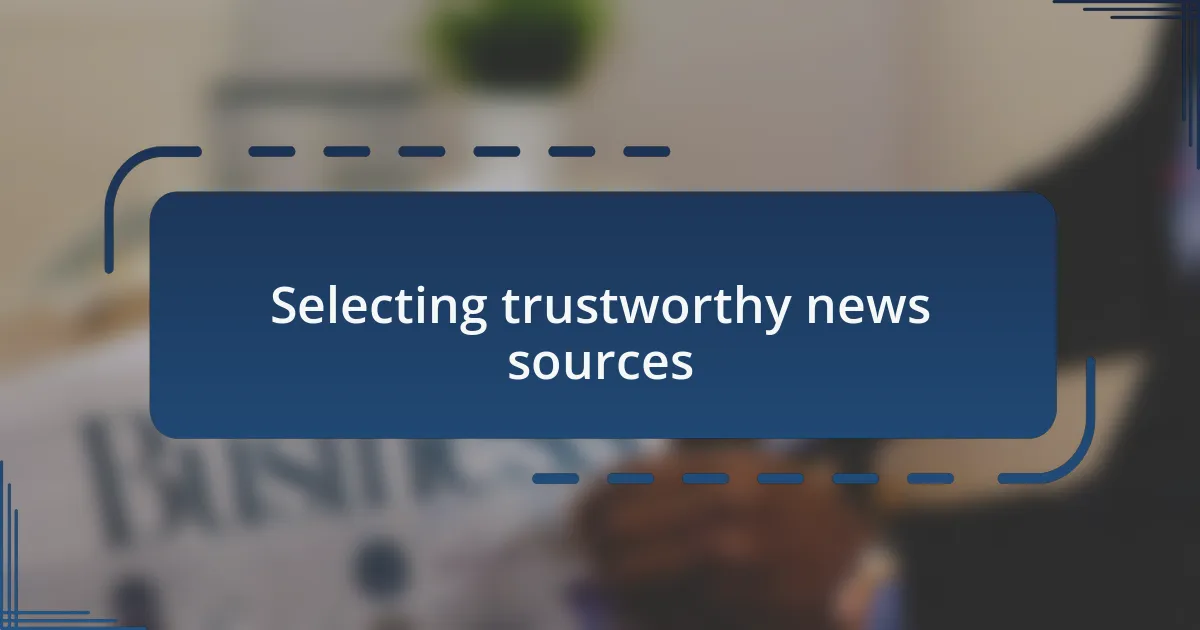
Selecting trustworthy news sources
When selecting trustworthy news sources, I prioritize outlets known for their rigorous fact-checking and transparency. I remember once coming across a sensational article that claimed an outrageous event had taken place. However, after a little digging, I discovered that the source had a reputation for unfounded reporting. Have you ever felt the frustration of realizing you were misled by a headline? That experience reminded me to always consider the source before taking any information at face value.
I also look for sources that provide context alongside their stories. One day, while reading about a political event, I found myself confused by the complexities of the situation. I switched to a journalist who contextualized the events with historical background and expert opinions. This kind of depth not only clarifies the news but also enriches my understanding. How often do we stop to think that a headline can only tell part of the story? It’s those layers of information that truly inform my perspective, and I strive to seek them out.
Another key factor for me is checking the author’s credentials and expertise. If I read an article about health issues, I want to know if it’s written by a healthcare professional or a journalist with experience in that field. I once read an opinion piece on climate change by someone without a solid background, and it made me question the validity of the information presented. Why settle for less when there are countless professionals eager to share their insights? This approach not only informs my views but also fosters trust in the sources I choose to rely on.
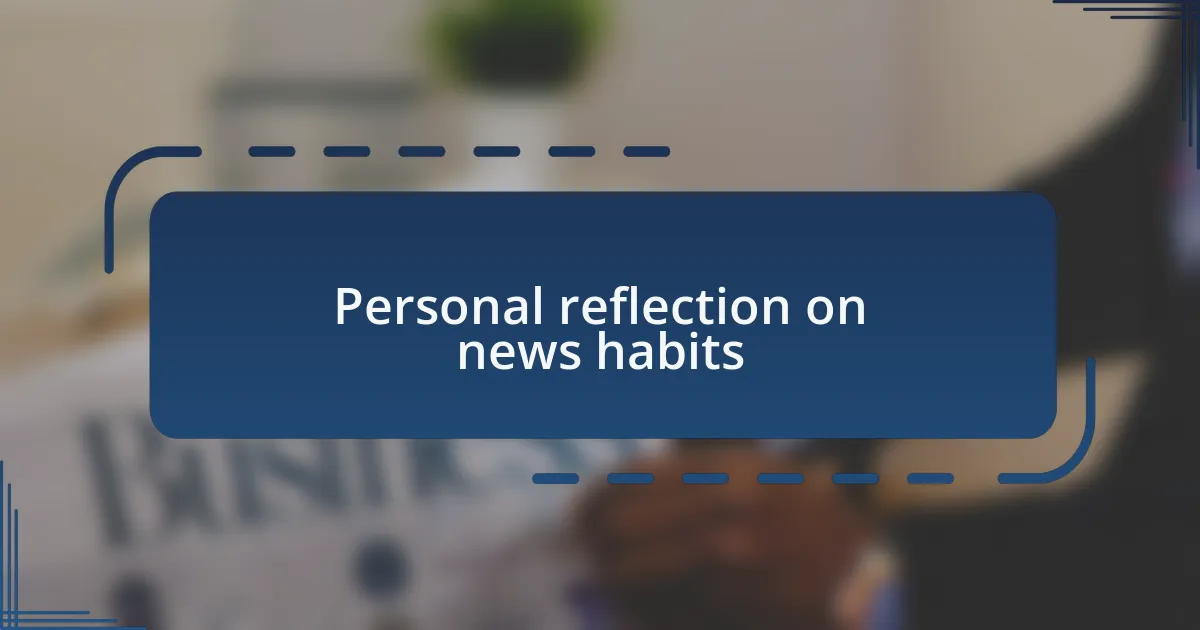
Personal reflection on news habits
Reflecting on my own news habits, I’ve noticed how crucial it is to limit exposure to sensational headlines. I recall a time when I fell down a rabbit hole after clicking on a particularly shocking news story. The anxiety that followed from reading constant doom and gloom was overwhelming. Have you ever experienced that sense of dread from certain types of news? It made me rethink how I consume information and the importance of curating what enters my mind.
While balancing my news consumption, I try to engage with a variety of viewpoints. Recently, during a discussion with a friend, we explored differing opinions on a trending issue. Instead of just defending my stance, I listened and learned to appreciate the nuances of the other perspective. I realized that this approach not only calmed any potential frustration but also broadened my understanding. Isn’t it fascinating how dialogue can transform our views? This thought encourages me to seek out diverse sources and not just retreat into my comfort zone.
Time management also plays a significant role in my news habits. I find that setting specific times to check the news helps me stay informed without becoming overwhelmed. Last week, I dedicated an hour each morning to catch up while enjoying my coffee. Breaking it up into manageable sessions made the information feel less daunting. How often do we lose ourselves in endless scrolling? I believe carving out intentional moments allows me to be more present and balanced, ultimately transforming my news experience into something more enriching.
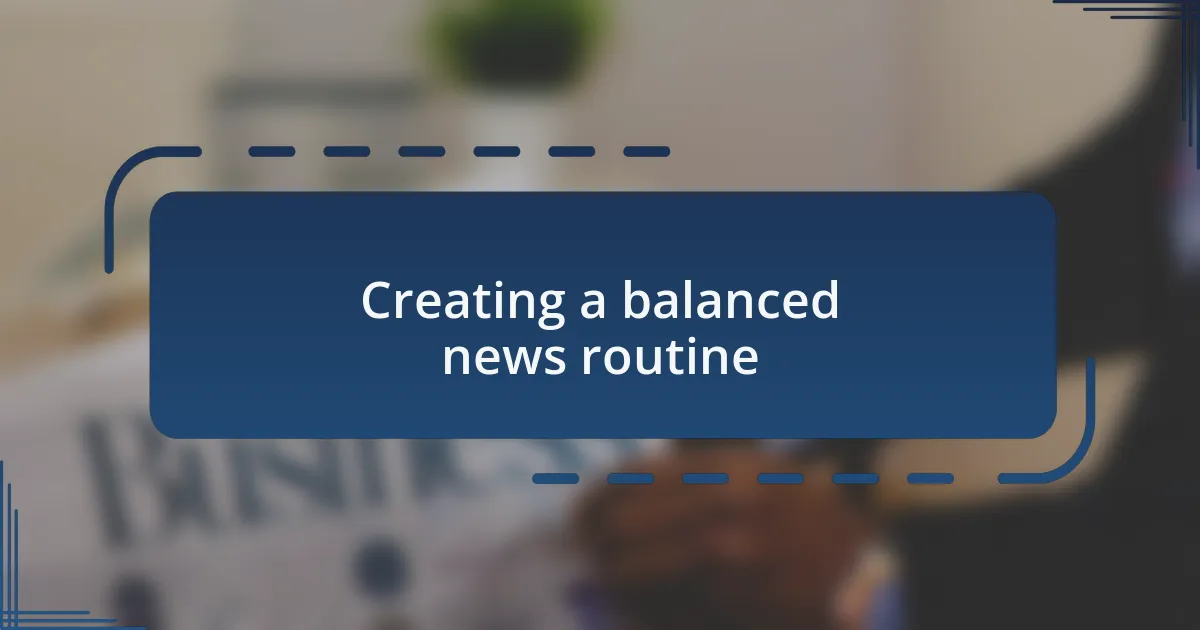
Creating a balanced news routine
Creating a balanced news routine begins with strategic selection. I remember a phase when I relied solely on social media for my news. The endless barrage was overwhelming, filled with opinions rather than facts. It struck me that curating my sources—opting for well-researched articles and reputable outlets—was essential. Don’t you find that consuming quality over quantity keeps the noise at bay?
In addition to selective sourcing, I practice timing my news intake. I’ve discovered that diving into the headlines right before bed was a recipe for restless nights. Now, I reserve that time for a good book or a podcast instead. This shift not only protects my sleep but also allows me to start my day with a clear mind. Have you thought about how your news routines might impact your daily mood?
Lastly, I believe in incorporating moments of reflection after consuming news. For instance, I often take a few moments to jot down my thoughts or feelings about what I just read. This way, I process not just the information but its emotional impact on me. Isn’t it powerful to recognize how news influences our mental landscape? This simple practice helps me stay grounded and balanced amidst the chaos.